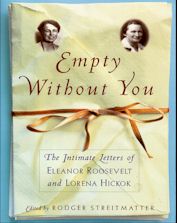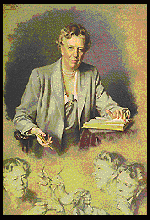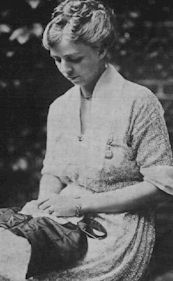 |

 Intimacy and the Gift of Awareness |
|
By Jack Nichols
The enduring Mrs. Roosevelt remains--at least in spirit--alive and well in the White House. Hillary Rodham Clinton has freely admitted to carrying on imaginative conversations with her long ago predecessor, drawing on Mrs. Roosevelt's wisdom, she once said, while growing her own. The Eleanor Hillary admires today had, within the mid-century portals of the White House--a secretive extra-marital affair, one, in fact, that was homosexually-inspired. Before this affair blossomed, it appears, the saintly Franklin D. Roosevelt himself had first become smitten by his social secretary. During the Roosevelt years, however, there was no puritan prosecutor like Ken Starr peeking through Oval Office blinds.
 Streitmatter's new book, Empty Without You: The Intimate Letters of Eleanor Roosevelt and Lorena Hickok (Free Press, 1998) assembles loving correspondence between Eleanor and Lorena. Among the letters is one telling how the revered First Lady placed Lorena's picture on her bedroom wall so she could kiss it before going to bed and upon awakening. She wrote: "I would give a great deal to put my arms around you and to feel yours around me. I love you deeply and tenderly." Prior to going on a 1934 vacation she told her female friend:
Streitmatter's new book, Empty Without You: The Intimate Letters of Eleanor Roosevelt and Lorena Hickok (Free Press, 1998) assembles loving correspondence between Eleanor and Lorena. Among the letters is one telling how the revered First Lady placed Lorena's picture on her bedroom wall so she could kiss it before going to bed and upon awakening. She wrote: "I would give a great deal to put my arms around you and to feel yours around me. I love you deeply and tenderly." Prior to going on a 1934 vacation she told her female friend:
Dearest, we are happy together & strong relationships have to grow deep roots. We're growing them now partly because we are separated… I'll be glad when Ellie can be with you, tho' I'll dread that too just a little…love is a queer thing, it hurts but it gives one so much more in return…a world of love & I do put my arms around you and in my dreams, dear one.
Clearly, Eleanor Roosevelt was among the first Caucasians in proximity to power who spoke up to foster better conditions in America's black communities. A defining moment arrived when she took to the side of the great black opera diva, Marion Anderson, following that magnificent singer's exclusion from Constitution Hall by bigots parading as the Daughters of the American Revolution. Florence King made the following sense out of her Southern kin's response to Eleanor: "Now I understand how it was possible for my family to worship FDR despite all the things he had done that enraged them. They had used 'Southern Logic' to 'straighten everything out just fine'. It was very simple: credit Franklin, better known as He, for all the things you like and blame Eleanor, better known as She or 'that woman' for all the things you don't like. That way, He was cleared, She was castigated, and We were happy." The capabilities that Eleanor Roosevelt exhibited as First Lady had been long in the making. Blanche Wiesen Cook relates that prior to living in The White House, she'd been head of the Women's Democratic Committee, a major fund raiser for many causes, the owner of a school and a monthly women's newspaper, and—starting in 1925-- the author of a monthly column and the voice on her own radio program. Still, says author Cook, she was exceedingly modest. Even after she'd become known as First Lady of the World, she flew to the Midwest and noted, without realizing it was for her, that there was a red carpet on the tarmac. "Oh," she said, "There must be somebody important on the plane." Eleanor's biographer says she finds such modesty both painful and marvelous. "She never really appreciated how important she had been to so many."
 "Eleanor Roosevelt, to her credit, made the connection: racism and fascism there (under the Nazis) = racism, segregation and lynching here," says biographer Cook. The second volume of Cook's ongoing research, covering the White House years, is due out this spring. The first volume titled Eleanor Roosevelt 1884-1933 (Penguin Books, 1993) shows how Ms. Cook's subject was far in advance of FDR as a social
visionary.
"Eleanor Roosevelt, to her credit, made the connection: racism and fascism there (under the Nazis) = racism, segregation and lynching here," says biographer Cook. The second volume of Cook's ongoing research, covering the White House years, is due out this spring. The first volume titled Eleanor Roosevelt 1884-1933 (Penguin Books, 1993) shows how Ms. Cook's subject was far in advance of FDR as a social
visionary.
Cook recently told Walt Whitman scholar, Gary Schmidgall, that Eleanor had "set a crusading style for the first lady that no other presidential wife has emulated, though Hillary at first said she intended to do so. In an unprecedented way, Eleanor said 'This is what you can do with power and influence. Watch me work.' " Eleanor refused the ministrations of secret service protectors. She seemed fearless and had actually presented Franklin with a book by Henry David Thoreau in which a line appeared that became—with only a minor word change-- the World War II President's most famous quip: "Nothing is so much to be feared as fear." It was in 1932 that Lorena Hickok met Eleanor while working for the Associated Press. Assigned to cover the comings and goings of the First Lady, Lorena at 40 was nearly a decade younger than the 49 year-old Mrs. Roosevelt. Their intense attachment and a resulting correspondence continued to flourish over the following 30 years, though time and circumstance often kept the two women apart. Letters that spoke too directly to their mutual attraction were purposely burned, but enough survived to reveal a relationship not only deeply affectionate, but physically intimate as well.
 The bond between Eleanor and Lorena found the reporter exercising a strong influence on the First Lady, helping shape her approach to troubling social and political issues. But even before they'd met Eleanor had expressed—as early as 1923—views about women and marriage that today would doubtlessly infuriate fundamentalists like Jerry Falwell, Pat Robertson, Gary Bauer and James Dobson. Writing about Tibet, she said, "It has been brought to my attention that the women of Tibet have many husbands, which seems to me a very good thing, since so many husbands have many wives." A Taslima Nasrin before her time.
The bond between Eleanor and Lorena found the reporter exercising a strong influence on the First Lady, helping shape her approach to troubling social and political issues. But even before they'd met Eleanor had expressed—as early as 1923—views about women and marriage that today would doubtlessly infuriate fundamentalists like Jerry Falwell, Pat Robertson, Gary Bauer and James Dobson. Writing about Tibet, she said, "It has been brought to my attention that the women of Tibet have many husbands, which seems to me a very good thing, since so many husbands have many wives." A Taslima Nasrin before her time.
Eleanor's affair with Lorena was kept so secret that the prying press-hounds and the puritan posses of her day enjoyed no successes in their Starr-like attempts to zero in on the women's privacy. A conversation at the railroad station between the closeted First Lady and a young woman, a reporter, was preserved by her lover: Reporter: Where are you going Mrs. Roosevelt? Mrs. Roosevelt: I'm dining with a friend. Reporter: Who is your friend? Mrs. Roosevelt: I'm sorry but I cannot tell you. It's a purely private and personal engagement. Reporter: May I follow you and wait outside?" Mrs. Roosevelt, emphatically: You may not! I told you it's a private, personal dinner engagement. There will be no story about it. Reporter: But I have to follow you, Mrs. Roosevelt. Mrs. Roosevelt, beginning to get really annoyed: I'm sorry, but you cannot follow me. If you insist, I shall spend the rest of the evening right here in the station. But I am not going to be followed—by you or anybody else. Today, it is now possible to follow the real Eleanor Roosevelt not only to find how same-sex love and affection inspired her but how that same singular relationship affected public matters for the better—bringing with it a burning concern not only for America's welfare but for the health of the planet itself. |

© 1997-99 BEI
 Eleanor Roosevelt--inscribed for Lorena Hickok
Eleanor Roosevelt--inscribed for Lorena Hickok